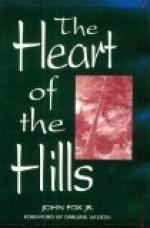“I hain’t got no right to say a word, just because Babe air my own brother. Mebbe Babe knows who the man was, but I don’t believe Babe done it. Hit hain’t enough that he was jes’ seed a-comin’ outen the bushes, an’ afore you go a-layin’ fer Babe, all I axe ye is to make plumb dead shore.”
It was a strange new note to come from his mother’s voice, and it kept the boy still silent from helplessness and shame. She had spoken calmly, but now there was a little break in her voice.
“I want ye to go back, an’ I’d go blind fer the rest o’ my days if that land was yours an’ was a-waitin’ down thar fer ye.”
From the next room came the sound of Mavis’s restless feet, and the boy rose.
“I hain’t a-goin’ to lay fer Babe, mammy,” he said huskily; “I hain’t a-goin’ to lay fer nobody—now. An’ don’t you worry no more about that land.”
Half an hour later, just when day was breaking, Mavis sat behind Jason with her bundle in her lap, and the mother looked up at them.
“I wish I was a-goin’ with ye,” she said.
And when they had passed out of sight down the lane, she turned back into the house—weeping.
XIV
Little Mavis did not reach the hills. At sunrise a few miles down the road, the two met Steve Hawn on a borrowed horse, his pistol buckled around him and his face pale and sleepless.
“Whar you two goin’?” he asked roughly.
“Home,” was Jason’s short answer, and he felt Mavis’s arm about his waist begin to tremble.
“Git off, Mavis, an’ git up hyeh behind me. Yo’ home’s with me.”
Jason valiantly reached for his gun, but Mavis caught his hand and, holding it, slipped to the ground. “Don’t, Jasie—I’ll come, pap, I’ll come.” Whereat Steve laughed and Jason, raging, saw her ride away behind her step-father, clutching him about the waist with one arm and with the other bent over her eyes to shield her tears.
A few miles farther, Jason came on the smoking, charred remains of a toll-gate, and he paused a moment wondering if Steve might not have had a hand in that, and rode on toward the hills. Two hours later the school-master’s horse shied from those black ruins, and John Burnham kept on toward school with a troubled face. To him the ruins meant the first touch of the writhing tentacles of the modern trust and the Blue-grass Kentuckian’s characteristic way of throwing them off, for turnpikes of white limestone, like the one he travelled, thread the Blue-grass country like strands of a spider’s web. The spinning of them started away back in the beginning of the last century. That far back, the strand he followed pierced the heart of the region from its chief town to the Ohio and was graded for steam-wagons that were expected to roll out from the land of dreams. Every few miles on each of these roads sat a little house, its porch touching the very




